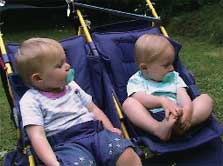 These are questions that hit close to home for me. My twin girls LOVED their pacifiers – they actually called them “Wee-ahs” - and I really struggled with “weaning” them from their “Wee-ah” habit. But, call it a “wee-ah,” a “soothie,” a “binky,” a “noonoo,” or even a “dummy,” the pacifier can help soothe a baby and provide parents with some peace and quiet. So, are pacifiers all that bad, and when is the best time to wean our kids from one? In this issue of “Tokyo Families” I will look at the pros and cons of pacifier use, and in the next issue I will tackle “breaking the pacifier habit.”
These are questions that hit close to home for me. My twin girls LOVED their pacifiers – they actually called them “Wee-ahs” - and I really struggled with “weaning” them from their “Wee-ah” habit. But, call it a “wee-ah,” a “soothie,” a “binky,” a “noonoo,” or even a “dummy,” the pacifier can help soothe a baby and provide parents with some peace and quiet. So, are pacifiers all that bad, and when is the best time to wean our kids from one? In this issue of “Tokyo Families” I will look at the pros and cons of pacifier use, and in the next issue I will tackle “breaking the pacifier habit.”
Babies love to suckle and research shows that 75% to 85% of American infants use pacifiers, most within their first few weeks of life. In fact, a new study in the journal “Pediatrics” (2005) reported that pacifier use may prevent sudden infant death syndrome (SIDS). Specifically, researchers found that the risk of SIDS was 90% less among infants who used a pacifier than among infants who did not use one. (Please refer to American Academy of Pediatrics at http://www.aap.org/healthtopics/sleep.cfm for a complete review of SIDS prevention guidelines).
In terms of speech and language development, there is not enough clear evidence to say that prolonged use of a pacifier can delay communication skills. However, that said, chronic use of a pacifier has been linked to poor alignment of the teeth and “tongue thrust” (i.e., the tongue goes between the teeth rather than staying behind them) which can result in difficulties saying sounds like “s,” “z,” “ch,” and “sh.” In addition, it is my experience that children over 1 year who use a pacifier for much of their waking hours are not talking as much as other children. This is because constant pacifier use may be preventing them from talking to other kids during play, and play is where children learn.
So, there is no simple answer, but in general, I recommend that pacifier use be limited to sleep times and stressful situations (e.g., long car rides) after 1 year of age. Limiting pacifier use, especially in social situations, will provide your children with a better opportunity to practice their speech and language skills.

